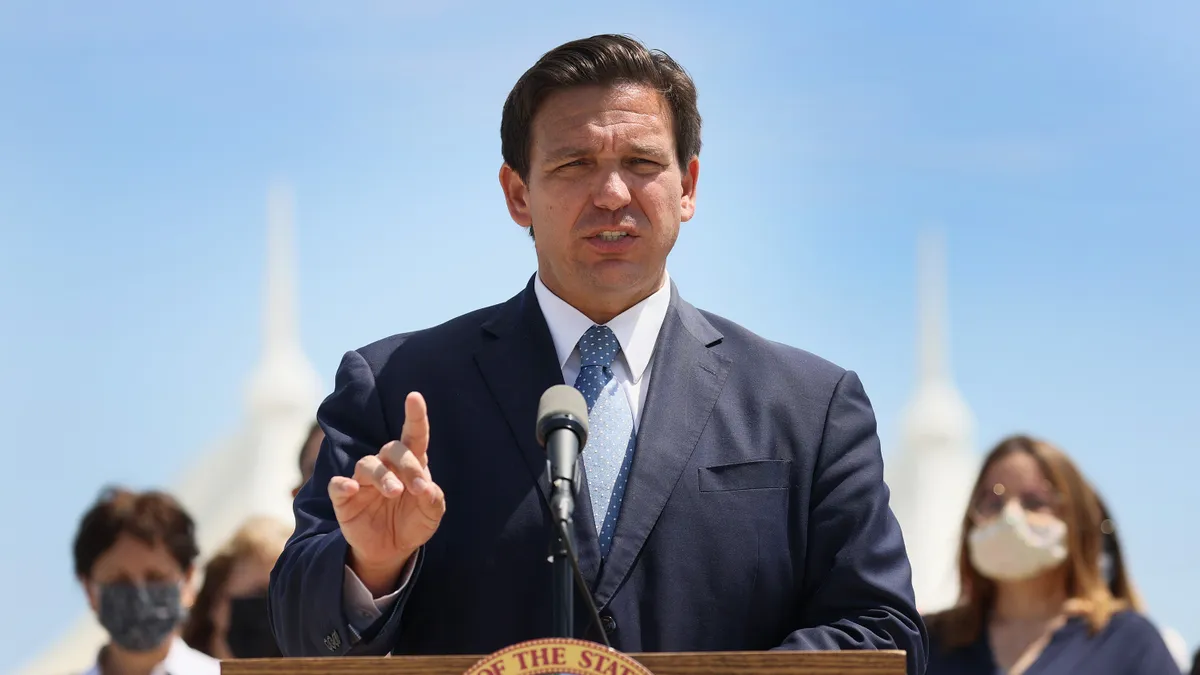Dive Brief:
- A bill signed by Florida Gov. Ron DeSantis on Monday allows universal access to taxpayer-funded vouchers for private school tuition, making it one of the largest state school choice programs in the country, according to the governor and others.
- For decades, Florida has provided publicly-funded school choice programs to specific subgroups of students, such as those with disabilities and those from low-income families. This legislation expands the scope of authorized uses, including those with higher family incomes, for scholarships. An estimated 116,603 private school students enrolled in participating schools in the 2023-24 school year would be among those eligible, according to a staff analysis of the legislation.
- At least 32 states have programs that provide access to private school tuition through tax-funded school choice programs using a variety of approaches that include tax-credit scholarships, vouchers and education savings accounts, according to FutureEd at the Georgetown University McCourt School of Public Policy. These programs provide an estimated $4 billion for 690,000 students.
Dive Insight:
According to a statement from DeSantis, the state already has 1.3 million students attending a school of their choice.
The measure will continue to prioritize participation for students whose household incomes do not exceed 185% of the federal poverty level and would create a second tier of priority level for those families at 185% to 400% of the federal poverty level.
Those supportive of voucher programs and other publicly funded school choice programs say parents want to be empowered with choosing their child’s school. Supporters and some research also say the growth of vouchers has positive impacts on nearby public school systems through the increased competition for students.
"The historic achievement of universal scholarships in Florida is just the beginning,” said Maury Litwack, founder of Teach Coalition, in an emailed statement. "Florida is paving the way and our activists are eager to take this momentum and truly make education affordable for all students."
Litwack added that the nonprofit organization, which advocates for equitable access to funding and quality education for private schools, is working with partners in other states to develop programs similar to Florida's.
But those opposed are concerned that publicly-funded programs that support private school choice are taking resources and money away from the public education system where most of the students in the nation attend schools.
A recent report by Public Funds Public Schools, a nonprofit that advocates that public funds be used to support public schools, found that in several states, investments in public schools declined as voucher spending grew. Another analysis released earlier this month from the Institute on Taxation and Economic Policy found that in Arizona, Louisiana and Virginia, more than half of all voucher tax credits were going to families with annual incomes over $200,000.
Still, others believe there can be more harmony between public and private schools. They say that by increasing access to private school attendance through publicly-funded subsidies, public schools could be less overcrowded and better resourced.
Additionally, the issue is politically charged, with Republicans favoring school choice expansion to give families more options and Democrats urging lawmakers to make more investments in public schools rather than dilute resources.
In a speech Tuesday in Washington, D.C., Randi Weingarten, president of the American Federation of Teachers, called the school privatization movement an "extremist scheme by a very vocal minority of Americans."
"It’s hurting our efforts to do the work we need to do, which is educating the nearly 50 million kids who attend America’s public schools," Weingarten said.
Among other provisions in the 114-page Florida legislation, there's a requirement that private schools participating in scholarship programs inform parents, on the school’s website or in writing, of the potential changes in special education services if parents transfer students with disabilities from a public school to a private school.
A 2017 report by the U.S. Government Accountability Office recommended better communication to parents about the likely loss of federal special education rights once a student attends a private school at the parents' discretion. At the time, GAO said more than half of voucher and education savings programs were designed for students with disabilities.
According to FutureEd, about a third of the 64 existing voucher, education savings account, and tax-credit scholarship programs are specifically for students with disabilities.













